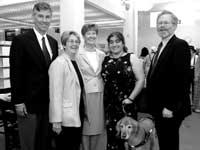
In the Face of Adversity…
by
Michelle Accorso
Courtney Gross was born with
cataracts. By the time she was eight years old, although
she had endured numerous operations, her vision began
to deteriorate significantly. Glasses did not help
and although she loved reading, she wasn’t able
to access the books she needed for school. By the age
of ten, Courtney was completely blind. Undaunted, her
mother, a teacher, enrolled her at the Heiskell Library.
Founded in 1895, the New York Public Library (NYPL)
has spent over a century expanding its resources to
children, teens and adults. With the generous support
of the late Andrew Heiskell, trustee of the NYPL, the
Heiskell branch located at West 20th Street now also
serves as an oasis to the blind and visually impaired.
With a passion for knowledge, Gross refused to let
her handicap stand in the way of her goals, her thirst
for knowledge and her indomitable independence. The
Heiskell Library began sending her books on tape and
books in Braille, both for her classes and recreational
purposes.
“My hope is that people come to appreciate this
library and the people who work here as much as I’ve
come to enjoy them,” Gross stated.
Mary K. Conwell, Senior VP
and Director of the Branch Libraries, commented, “People who read less participate
in civic affairs less. That’s an interesting situation
where I think libraries—a place that engenders
civic participation—can really help. The library
is a place where people can come together and talk about
issues in a neutral place.”
A graduate from John Jay College with a masters degree
in forensic science, Gross is certainly one of the individuals
taking advantage of the many opportunities that the library
offers. Her parents never let her use her blindness as
an excuse, so at a very young age Gross learned to live
independently. With the help of Xavier, her seeing-eye
dog that she acquired when she was 18, she made her way
to school via public transportation.
As someone who often came
across the challenge of organizations refusing to make
resources available to her, Gross was still able to
take the SATs in Braille. “There’s
no excuse for not making material available in whatever
format someone needs,” she commented. Not wanting
the SAT’s or other exams read to her, Gross has
spent her entire life working towards achieving and maintaining
independence. “I was always in regular classes.
Some kids were understanding and some were cruel. In
all honesty, however, in all the cruel people I’ve
encountered in life—and there have been quite a
few—they have helped to make me stronger. People
sometimes say that if they could do their lives over
again they would change so many things...for me, I wouldn’t
change anything because if anything was different, who
knows where I would be right now?”#
More information on the Heiskell library and the
many advances of technology for the blind and visually
impaired will be continued in the September issue of Education
Update.
